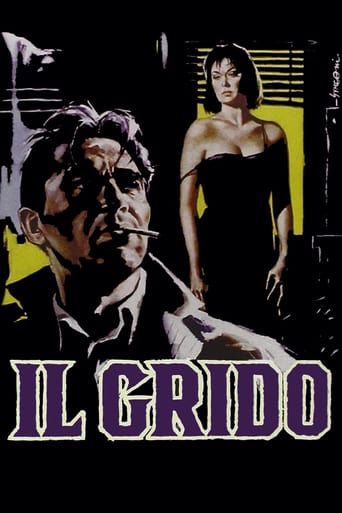mrpinbert
A local theater is currently showing an Antonioni Exhibition and doing a retrospective of several of his films.Although I am familiar from film studies with this period of Italian cinema I had not yet seen any Italian Neo-Realist films, or any Antonioni films for that matter.The film starts of well with some decent drama but quickly evolves into a meandering tale. Throughout the film I often found myself on the verge of boredom, thankfully Aldo's encounters with different women kept me still somewhat entertained. The existentialist themes of this story are not lost on me but I did find this somewhat of a chore to sit through.I only really put together the films themes in my head after watching it. So it did leave me thinking but not very much.This is a film I could only recommend to someone that is actually interested in this period of Italian cinema and this particular director. A solid film but nothing spectacular. I followed it up with watching L'Eclisse for the first time a couple of days later, which I enjoyed a great deal better.
cesare-petrillo
I just watched Il Grido after many years and surprisingly I regret to say that this is a completely awful movie, especially if you get to realize how fake the Italian dubbing sounds. I have no idea what kind of language they were speaking while filming, but the final result sounds like a silent movie with an added soundtrack. Steve Cochran was an outstanding actor always delivering unforgettable performances. (Try and see Come Next Spring, Tomorrow Is Another Day, Highway 301 or Don Siegel's Private Hell if you need any proof). Unfortunately his actual voice (and acting) is lost here. Well, maybe for non-Italian and non-Cochran audiences, this might become an interesting item. Cesare Petrillo
MartinHafer
Some folks watching "Il Grido" might be surprised to see some Americans in this Italian film. In the 1950s and 60s, quite a few Italian directors (such as Antonioni and Fellini) cast Americans and had them dubbed into Italian. Most were second and third tier actors at the time (such as Steve Cochran, Richard Basehart and Anthony Quinn) but later even some big name stars performed in the Italian films (such as Burt Lancaster). I think the reason they did this was to attempt to increase the marketability of the movies outside of Italy--and these stars would help.The film begins with Irma (Alida Valli) learning that her husband is dead. He apparently has been gone for many years and the interim she's been living with Aldo (Steve Cochran). They even have a child together. Here's the odd part, however, now that she knows she's a widow, she tells Aldo to leave! He is not at all happy and eventually he disappears along with his daughter. For the rest of the film, Aldo and his daughter move from town to town. However, Aldo has difficulty connecting with other women and he rejects opportunity after opportunity for relationships. Instead, he remains socially isolated and depressed.Overall, you'll probably find this film a bit slow and depressing. While this is usually a big turn-off, it actually works here. Director Antonioni wants to create a depressing portrait of a lost man and does it quite well. The simple piano score sure helps with this. Not a film for everyone but exceptionally well made.By the way, at one point in the film, you see folks saying they caught a couple porcupines and were going to eat them. These actually were hedgehogs--you never would hold porcupines the way they did nor do I think you'd eat them! This is simply a mistranslation.
FrankiePaddo
Known as "The Outcry" in the U.S. A wonderful if disturbing film about alienation and modern society. Not for those who like bouncy, happy films.The great though relatively forgotten American actor Steve Cochran is near perfect as the worker who finds he cannot communicate, with those he loves, and so begins a downward spiral towards a state of mental disintegration. What is interesting are the Marxist and Freudian overtones that Antonioni puts on the character. The protagonist as the result of his economic position in a capitalist society ( he only has his labour to sell) is uprooted from his community and therefore alienated from his environment, and so becomes alienated from those he loves. The harder he tries the more he withdraws until he perceives he can suffer no more.Cochran always was very good at playing "heavies" or "playboys", and here he manages to bring both to his underdog character who is strong, brutish and handsome. At the same time he manages to convey the loneliness and vulnerability the character lives through showing that those attributes are not enough to survive.Antonioni directs with a sure hand a picture of a successful, postwar, industrial Italy where everything is not as easy as it seems. Needless to say the film is in black and white and photographed in grainy neo realist style. The landscapes, in true Antonioni fashion, are bleak, and the loneliness and isolation from others is reflected in the distance between buildings. The leisured pacing, adds to the feeling that life drags on without change.Antonioni's characters normally, as his films L'eclisse and Red Desert, as with fellow Italian directors Fellini and De Sica during the same period, usually have uncertain futures, as if there is a hidden side to Italy's postwar economic miracle. Here, it's as if the protagonist has a manifest destiny from which there is no redemption.



